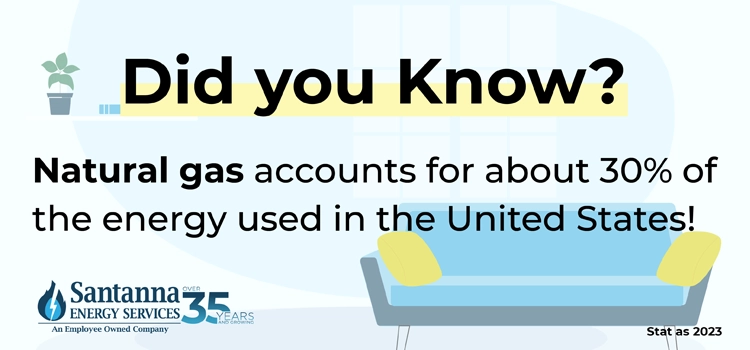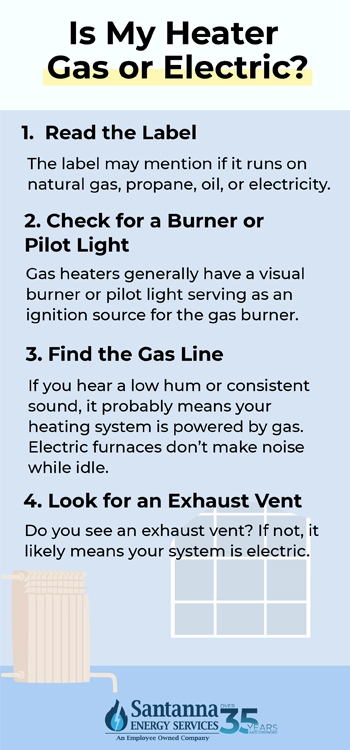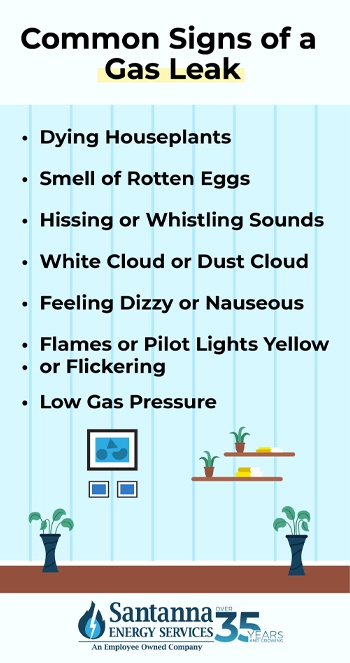What is Natural Gas Used for in My Home? 5 Ways You Use It Everyday
by Tyler Castle
7.2 min read

Natural gas is a clean and efficient source of energy that plays a vital role in powering our homes. According to the U.S. Energy Information Administration, more than half of U.S. residents use natural gas in their homes. That’s a lot of people who rely on natural gas to fulfill their everyday needs! Take a look at five of the ways residents are using natural gas to power their homes and other facts about natural gas you’ll love to learn:
Key Points of This Article:
- Natural gas is an efficient, low‑emission energy source that reliably powers many household systems.
- It is commonly used for cooking, heating water, warming your home, fueling fireplaces, and drying clothes.
- Many appliances such as furnaces, water heaters, stoves, dryers, and outdoor grills also run on natural gas.
- Home heating typically uses the most natural gas, and safety steps are essential if you ever smell gas or suspect a leak.
What is natural gas?
Natural gas is a naturally occurring fossil fuel that is made up of primarily methane, but also contains other hydrocarbons such as ethane, propane, and butane. It is often found alongside oil deposits and can be extracted through drilling. This odorless and colorless gas is non-toxic and lighter than air, making it a safe option for use in homes.
Natural gas is a popular choice for powering homes due to its many benefits. It is highly efficient and produces lower carbon emissions compared to other fossil fuels; this results in lower energy bills making it an environmentally friendly option. Natural gas is also reliable and readily available, ensuring a steady supply of energy for your home.
What are the main uses of natural gas in my home?
Natural gas has a variety of uses that make it an essential part of our daily lives. Here are some of the most common ways natural gas is used in your home:
Cooking: When cooking, natural gas often provides better temperature control which makes it a popular choice for home chefs. However, accuracy isn’t the only ingredient making natural gas stovetops a good choice; they also use significantly less energy than an electric stove. It takes about three times as much energy to produce and deliver electricity to your stove than with a natural gas stove. This is typically because the units heat and cool more quickly.
Heating water: Water heaters powered by natural gas heat water quickly and consistently. Since the price of natural gas is usually lower than electricity, using natural gas for any energy-consuming device has the potential to save you money on your energy bill. Natural gas hot water heaters typically range from 20 to 100 gallons to fit a variety of households.
Heating your home: Natural gas is the preferred choice for heating homes due to its efficiency and reliability. When used in a furnace, natural gas produces heat quickly and evenly, making it an ideal option for keeping your home warm and cozy during colder months. It also burns cleanly, reducing harmful emissions.
Lighting a fire: Gathering firewood, cleaning up ashes and dealing with sparks are not your only option if you want to enjoy a nice fire. There are actually natural gas fireplaces that are highly efficient without all the mess of a wood-burning model. With a controllable burner and natural gas logs you can get the same effect of a wood-burning fireplace and get more control over the flame.
Drying your clothes: Natural gas clothes dryers use 50 percent less power compared to electric models. Natural gas dryers use a larger quantity of dry, absorbent air, which passes through your clothes to dry them more quickly. With a lifetime burner and automatic shut-off options, a natural gas dryer might be the perfect option for a busy family.
What appliances use natural gas in my home?
There are many other appliances in your home that may be powered by natural gas. Plus, with advancements in technology, these appliances are becoming increasingly energy-efficient and eco-friendly! Here are some of the most common appliances that use natural gas in your home:
- Furnace or Heating System
- Water Heater
- Stove and Oven
- Clothes Dryer
- Fireplace
- Outdoor Grills
What uses the most gas in my home?
Every household is different when it comes to energy consumption, but typically what uses the most gas in your home is your heating system. Depending on where you live, this can be especially true during the colder months when your heating system is working overtime to heat your home. So, it’s important to monitor your energy usage during the colder months to ensure you’re not surprised by higher energy bills.
What to do if you smell gas in your house
While natural gas safe is generally safe to use within your home, it’s important to remember the safety measures that come with it. If you smell gas within your home, it’s important to leave your home or building immediately as you might be experiencing a gas leak, which will cause harm to you and others. Next, as you are exiting your home, be sure to avoid touching or turning on any electrical appliances because an electrical spark can ignite the gas. Leave your door open as you exit to help ventilate the area, go to a safe location and call emergency services immediately.
What not to do if you smell gas in your home
If you smell gas in your home, there are certain actions you should avoid to ensure your safety. Here’s what not to do:
- Do not use open flames: Avoid lighting matches, candles, or any flames as this can ignite a gas fire.
- Don’t use your phone or any technology inside the building: Using phones inside the area where you smell gas can generate sparks and pose the risk of ignition.
- Don’t attempt to locate the source of the gas yourself: Leave the gas leak investigation to the professionals. The longer you stay in the infected area, the more you are likely to put yourself in harm’s way.
- Do not re-enter: Re-entering your home during a gas leak can cause you and your property serious harm. Wait to go back inside until emergency responders have told you it’s safe.
Can breathing in natural gas harm you?
The short answer is, yes, natural gas can harm you if you breathe in high levels of it. Natural gas is primarily composed of methane, which, when inhaled in high concentrations, can lead to adverse health effects. Breathing in natural gas can cause symptoms such as headaches, dizziness, nausea, fatigue, and difficulty breathing. In extreme cases, prolonged exposure to high levels of natural gas can lead to unconsciousness or asphyxiation.
Health risks associated with natural gas
If you breathe in high levels of natural gas, you’re putting yourself at risk for natural gas poisoning which can be fatal. Some common signs of natural gas poisoning include headaches, dizziness, nausea, fatigue, and respiratory difficulties. If you suspect you have any of these symptoms, seek medical attention immediately and call a utility professional; as this can be a sign of a gas leak in your home and gas poisoning in your body.
Although uncommon, natural gas can cause carbon monoxide poisoning. Low levels of carbon monoxide poisoning can cause shortness of breath and mild headaches. If you’re exposed to mild levels of CO2 poisoning, the following symptoms can cause death if not treated: dizziness, light-headedness, fatigue, confusion, disorientation, or overall weakness. Call 911 or poison control as soon as possible if you are experiencing any of these symptoms.
The next time you turn on your stove to cook a delicious meal or take a hot shower, remember that natural gas is hard at work making it all possible. From cooking and heating to powering appliances and providing warm water, natural gas truly is the backbone of our homes!
Santanna Energy Services is a supplier of renewable energy solutions in the United States, providing services to Illinois, Indiana, Pennsylvania, Michigan, and Ohio. We provide a wide range of energy services and products to meet the needs of both residential and small business customers. Our mission is to provide innovative and cost-effective energy solutions that will help our customers achieve their energy goals. With over 35 years of experience, we are committed to creating life-long relationships by providing quality service to customers, communities, and employees.
Tyler is an experienced energy professional, having worked for Santanna Energy Services, for the past four years. He is passionate about renewable energy and believes that diversifying the energy grid is the key to a sustainable future. Tyler is dedicated to supplying consumers with the best possible energy solutions and works diligently to make sure that Santanna can deliver the highest quality service.










